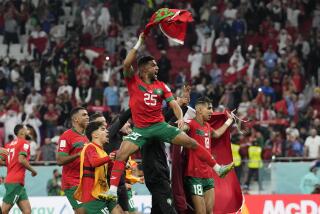African Nations’ Cup Win Fueled by Pyramid Power
- Share via
They were dancing like Egyptians up and down the Nile on Saturday night. From Alexandria to Aswan, Egypt celebrated its victory in the African Nations’ Cup.
A 2-0 triumph over South Africa in Ouagadougou, Burkina Faso, courtesy of goals by Ahmed Hassan and Tarek Mustapha, earned Egypt its fourth African championship. It also won the continental title in 1957, 1959 and 1986.
“I congratulate you for this historic feat,” Egyptian President Hosni Mubarak wrote in a telegram sent to the team.
In Cairo, where car horns and gunfire sounded throughout the night, millions were expected to welcome the team home this morning.
The victory was especially meaningful for Mahmoud al-Gohari. It made the former army colonel the first man to win the African Nations’ Cup both as a player and as a coach. He played on Egypt’s team in 1959.
Hassan’s goal in the fourth minute and Mustapha’s in the 12th rocked South Africa, and the defending champion was unable to recover in front of 30,000 fans on a scorching, cloudless day in Ouagadougou.
BENNI AND THE JETS
The odd thing about the final between the Pharaohs and Bafana Bafana (The Boys) was that the tournament’s two top goal scorers were effectively shut out.
The battle between Egypt’s Hossam Hassan and South Africa’s Benedict “Benni” McCarthy had been one of the highlights of the championship.
When 31-year-old Hassan scored two goals against Mozambique and three against Zambia, 20-year-old McCarthy replied with four against Namibia and one against Morocco.
McCarthy, who last year was plucked from the streets of Cape Town and signed to a five-year, $1-million contract by Ajax Amsterdam, then scored twice in South Africa’s 2-1 semifinal victory over the Congo.
Not to be outdone, Hassan, who plays for Egypt’s top club, Al-Ahly, scored twice in his country’s 2-0 semifinal victory over Burkina Faso.
That left both players with seven goals and a chance to match or better the tournament record of nine set by Zaire’s Mulamba Ndaye’s in 1974.
On Saturday, however, both were marked out of the game and had to settle for sharing the scoring honors.
QUOTE, UNQUOTE
The African Nations’ Cup comes with a virtual guarantee to provide not only entertaining matches but all sorts of oddities and a fair amount of controversy.
Africa now trails only Europe and South America in producing first-class soccer talent, but it is head and shoulders above the world in providing bizarre quotes.
During this tournament, it was Zambia’s German-born coach, Burkhardt Ziese, who outdid all of his predecessors by lashing out at his adopted country’s media for allegedly spreading rumors and gossip.
Politically correct (or astute) this is not. Read on.
“Just look at my Zambian lady writers,” Ziese said at one press gathering, referring to some female reporters nearby. “They’re there but they’re not listening, and tomorrow they will write all sorts of nonsense.
“Just look at them there enjoying their drink. They don’t understand anything about sport or about football. Those are the ones who are creating problems for Zambia. Those are the ones responsible for all the nonsense in the newspapers in Zambia. They are here to destroy Zambian football. That is reality.
“It’s just a shame there are just such pitiful people about.”
Ziese, not surprisingly, is not expected to be coaching Zambia for much longer.
THE WITCHDOCTOR
Another coach whose name will be in the news a lot in the coming months is Frenchman Philippe Troussier, who once again achieved the sort of miracle that long ago earned him the “white witchdoctor” tag.
Troussier, who has spent a decade in Africa and coached the Ivory Coast to its 1992 African Nations’ Cup triumph, this time took unheralded Burkina Faso all the way to the semifinals, where it lost to eventual champion Egypt.
Now, the man who once was fired by Nigeria for not toeing the government party line, is moving a bit farther south. As of today, he takes over from Jomo Sono as South Africa’s coach for the France ’98 tournament.
The South Africans are in for a treat.
Africa has soaked into Troussier’s blood and he has a good feel for the continent and its people.
“My philosophy is a mixture between white, black, African, European. I think it is a new vision, a new strategy, a new energy,” he said at one point during the tournament.
At another, he talked about the difference between coaching in Europe and Africa.
“I came here with specific ideas about organization,” he told Reuters. “You sleep at a certain time, you wake up at a certain time, you eat at a certain time. That does not work here. If you tell an African player that he must go to sleep at 10 o’clock in the evening, he will not understand.
“In Europe, when you lose a game, you always try to explain why you lost it. You can spend hours and hours going through the reasons. But sometimes it isn’t necessary to try and explain something. I have come to appreciate that in Africa.
“When we lose, we go and sit under a baobab tree. There’s a certain type of magic there.”
Troussier can only hope he gets the type of cooperation in South Africa he had in Burkina Faso.
“In 10 years in Africa, I have not really had any interference in my work,” he said. “Here, for example, I have a hotline to the president [Blaise Campaore]. If I need an aircraft to transport the team, I ring him up and he provides it. We have a working relationship, it is not interference.”
It’s a different world, is what it is.
HEY, THEY WON, DUDE
Nice to see that Germany’s coach, Berti Vogts, has lost none of his edge.
After his team had beaten, yes, beaten Oman, 2-0, Vogts ripped into the European champions, saying their performance had been “inexcusable.”
“There was no excuse for playing like that,” he said. “The ball was round, the pitch was flat, the turf was good and so was the weather--conditions were perfect.
“But I saw a lot of things that didn’t please me. The best player was the referee.”
Think what he might have said if Germany had lost.
Typically, though, the Germans answered by defeating fellow France ’98 team Saudi Arabia, 3-0, in Riyadh on goals by Oliver Bierhoff, Thomas Helmer and Olaf Marschall.
WORLD CUP WATCH
The Italian media have launched an intense campaign to persuade national team Coach Cesare Maldini to restore USA ’94 hero Roberto Baggio to Italy’s team. . . . England striker Robbie Fowler tore ligaments and suffered cartilage damage in his knee while playing for Liverpool and will miss the World Cup. . . . Argentina Coach Daniel Passarella, booed by fans after a 3-1 victory over Yugoslavia in Buenos Aires, has bowed to public pressure and recalled striker Gabriel Batistuta for a March 10 game against Bulgaria. . . . The Bulgarian federation, meanwhile, has arranged an $822,000 loan from a German bank to pay its players the bonus they earned for qualifying for the World Cup. “We have drawn the credit only because we want to be fair to the players and the trainers and pay them as we have promised,” said federation vice president Michail Kassabov. . . . In Kingston, Jamaica, World Cup qualifiers Nigeria and Jamaica played to a 2-2 tie. . . . Brad Friedel, the former UCLA goalkeeper who is backup to Kasey Keller on the U.S. national team, made his debut for Liverpool in the English Premier League on Saturday in a 2-1 loss to Aston Villa. Friedel’s debut ended a string a 212 consecutive starts for Liverpool No. 1 David James.
FINAL WHISTLE
Augusto Valido, the shoe-shine boy-turned-striker whose goal earned Brazilian club Flamengo its third consecutive league championship in 1944, died in Rio de Janeiro at 84. . . . George Male, the last of the great Arsenal players of the 1930s, died in London at 87. Male played on the Arsenal team that won the 1936 F.A. Cup Final and he also won four league championship medals with the Gunners in 1933, 1934, 1935 and 1938. He played 19 games for England.
(BEGIN TEXT OF INFOBOX / INFOGRAPHIC)
African Nations’ Cup Champions
1998: Egypt
1996: South Africa
1994: Nigeria
1992: Ivory Coast
1990: Algeria
1988: Cameroon
1986: Egypt
1984: Cameroon
1982: Ghana
1980: Nigeria
1976: Morocco
1978: Ghana
1974: Zaire
1972: Congo
1970: Sudan
1968: Zaire
1965: Ghana
1963: Ghana
1962: Ethiopia
1959: Egypt
1957: Egypt






